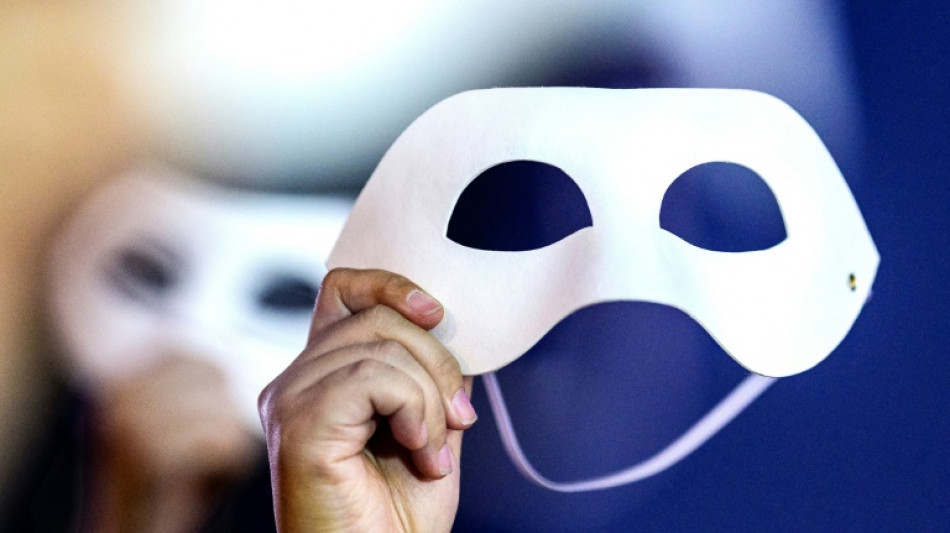
-
 Migrant's expulsion puts Washington Salvadorans on edge
Migrant's expulsion puts Washington Salvadorans on edge
-
Plan for expanded Muslim community triggers hope, fear in Texas

-
 Pakistan foreign minister due in Kabul as deportations rise
Pakistan foreign minister due in Kabul as deportations rise
-
White House touts Covid-19 'lab leak' theory on revamped site

-
 Dodgers star Ohtani skips trip to Texas to await birth of first child
Dodgers star Ohtani skips trip to Texas to await birth of first child
-
US senator says El Salvador staged 'margarita' photo op

-
 Ford 'adjusts' some exports to China due to tariffs
Ford 'adjusts' some exports to China due to tariffs
-
Thomas maintains two-shot lead at RBC Heritage

-
 US to withdraw some 1,000 troops from Syria
US to withdraw some 1,000 troops from Syria
-
Four killed after spring storms wreak havoc in the Alps

-
 Spurs' Popovich reportedly home and well after 'medical incident'
Spurs' Popovich reportedly home and well after 'medical incident'
-
Trump goes to war with the Fed

-
 Celtics chase second straight NBA title in playoff field led by Thunder, Cavs
Celtics chase second straight NBA title in playoff field led by Thunder, Cavs
-
White House site blames China for Covid-19 'lab leak'

-
 Norris edges Piastri as McLaren top Jeddah practice
Norris edges Piastri as McLaren top Jeddah practice
-
Trump warns US could ditch Ukraine talks if no progress

-
 Judge denies Sean 'Diddy' Combs push to delay trial
Judge denies Sean 'Diddy' Combs push to delay trial
-
80 killed in deadliest US attack on Yemen, Huthis say

-
 Lebanon says two killed in Israeli strikes in south
Lebanon says two killed in Israeli strikes in south
-
Trump says US will soon 'take a pass' if no Ukraine deal

-
 F1 success is 'like cooking' - Ferrari head chef Vasseur
F1 success is 'like cooking' - Ferrari head chef Vasseur
-
Cycling mulls slowing bikes to make road racing safer

-
 Macron invites foreign researchers to 'choose France'
Macron invites foreign researchers to 'choose France'
-
Klopp 'happy' in new job despite Real Madrid rumours: agent

-
 Alcaraz into Barcelona semis as defending champion Ruud exits
Alcaraz into Barcelona semis as defending champion Ruud exits
-
Vance meets Italy's Meloni before Easter at the Vatican

-
 Evenepoel returns with victory in Brabantse Pijl
Evenepoel returns with victory in Brabantse Pijl
-
Maresca confident he will survive Chelsea slump

-
 Mob beats to death man from persecuted Pakistan minority
Mob beats to death man from persecuted Pakistan minority
-
Lebanon says one killed in Israeli strike near Sidon

-
 Arsenal's Havertz could return for Champions League final
Arsenal's Havertz could return for Champions League final
-
US officials split on Ukraine truce prospects

-
 Client brain-dead after Paris cryotherapy session goes wrong
Client brain-dead after Paris cryotherapy session goes wrong
-
Flick demands answers from La Liga for 'joke' schedule

-
 'Maddest game' sums up Man Utd career for Maguire
'Maddest game' sums up Man Utd career for Maguire
-
Trial opens for students, journalists over Istanbul protests

-
 Gaza rescuers say Israeli strikes kill 24 after Hamas rejects truce proposal
Gaza rescuers say Israeli strikes kill 24 after Hamas rejects truce proposal
-
'Really stuck': Ukraine's EU accession drive stumbles

-
 'Not the time to discuss future', says Alonso amid Real Madrid links
'Not the time to discuss future', says Alonso amid Real Madrid links
-
74 killed in deadliest US attack on Yemen, Huthis say

-
 Southgate's ex-assistant Holland fired by Japan's Yokohama
Southgate's ex-assistant Holland fired by Japan's Yokohama
-
Vance meets Meloni in Rome before Easter at the Vatican

-
 Ryan Gosling to star in new 'Star Wars' film
Ryan Gosling to star in new 'Star Wars' film
-
Hamas calls for pressure to end Israel's aid block on Gaza

-
 Russia says Ukraine energy truce over, US mulls peace talks exit
Russia says Ukraine energy truce over, US mulls peace talks exit
-
58 killed in deadliest US strike on Yemen, Huthis say

-
 Museums rethink how the Holocaust should be shown
Museums rethink how the Holocaust should be shown
-
Three dead after deadly spring storm wreaks havoc in the Alps

-
 No need for big changes at Liverpool, says Slot
No need for big changes at Liverpool, says Slot
-
Bloody Philippine passion play sees final performance of veteran 'Jesus'


Tech firms fight to stem deepfake deluge
Tech firms are fighting the scourge of deepfakes, those deceptively realistic voices or videos used by scammers that are more available than ever thanks to artificial intelligence.
Ever-improving generative artificial intelligence (GenAI) tools have become weapons in the hands of bad actors intent on tricking people out of their money or even their identities.
Debby Bodkin tells of her 93-year-old mother receiving a telephone call, a cloned voice claiming, "It's me, mom... I've had an accident."
When asked where they were, the machine-made impersonator named a hospital.
Fortunately, it was a granddaughter who answered the phone, opting to hang up and call Bodkin at work where she was safe and well.
"It's not the first time scammers have called grandma," Bodkin told AFP. "It's daily."
Such deepfake phone scams typically go on to coax victims into paying for medical care or other made-up emergencies.
Used on social networks to hijack the notoriety of celebrities or other high-profile figures, sometimes for disinformation, deepfakes are also being exploited by criminal gangs.
Hong Kong police earlier this year revealed that a multinational firm employee was tricked into wiring HK$200 million (around US$26 million) to crooks who staged a videoconference with AI avatars of his colleagues.
A recent study by identification start-up iBoom found that a scant tenth of one percent of Americans and Britons were able to correctly tell when a picture or video was a deepfake.
A decade ago, there was a single AI tool for generating synthetic voices -- now there are hundreds of them, according to voice authentication specialist Vijay Balasubramaniyan, CEO of Pindrop Security.
GenAI has changed the game, he said.
"Before, it took 20 hours (of voice recording) to recreate your voice," the executive told AFP.
"Now, it's five seconds."
Firms such as Intel have stepped up with tools to detect GenAI-made audio or video in real-time.
Intel "FakeCatcher" detects color changes in facial blood vessels to distinguish genuine from bogus imagery.
Pindrop breaks down every second of audio and compares it with characteristics of a human voice.
"You have to keep up with the times," says Nicos Vekiarides, chief of Attestiv platform which specializes in authenticating digital creations.
"In the beginning, we saw people with six fingers on one hand, but progress has made it harder and harder to tell (deepfakes) with the naked eye."
- 'Global cybersecurity threat' -
Balasubramaniyan believes that software for spotting AI content will become standard at companies of all kinds.
While GenAI has blurred the boundary between human and machine, companies that re-establish that divide could soar in a market that will be worth billions of dollars, he said.
Vekiarides warned that the issue "is becoming a global cybersecurity threat."
"Any company can have its reputation tarnished by a deepfake or be targeted by these sophisticated attacks," Vekiarides said.
Balasubramaniyan added that the shift to telework provides more opportunity for bad actors to impersonate their way into companies.
Beyond the corporate world, many expect consumers to look for ways to fight off deepfake scams endangering their personal lives.
In January, China-based Honor unveiled a Magic7 smartphone with a built-in deepfake detector powered by AI.
British start-up Surf Security late last year launched a web browser that can flag synthetic voice or video, aiming it at businesses.
Siwei Lyu, a professor of computer science at the State University of New York at Buffalo, believes "deepfakes will become like spam," an internet nightmare that people eventually get under control.
"Those detection algorithms will be like spam filters in our email software," Lyu predicted.
"We're not there yet."
R.Braegger--VB



